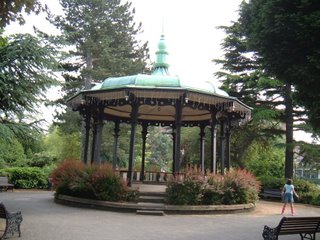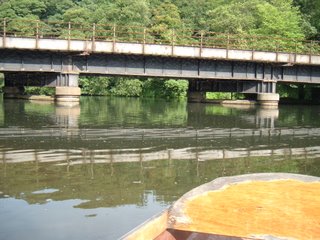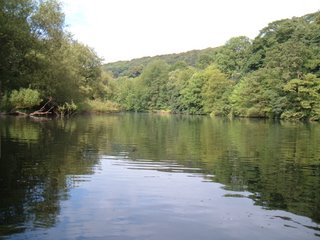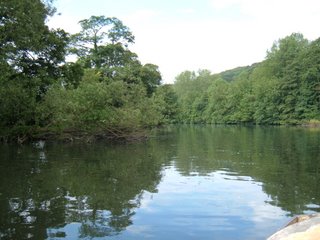bag lady goes fencing
I put my back out.
A fencing injury would be bad enough, but I hurt my back carrying too many bags.
It's a twenty-five minute train journey to work, with a walk at each end. I have only four bags when I start out. There's my handbag, decorated with the fencing-club badge but containing usual handbag things: purse, tissues, pencil-case, keys, bottle-opener, two small notebooks and so on. There's the large work bag: papers, two or three notebooks in different sizes, newspapers, magazines, three or four books for work, light reading (Slaughterhouse Five plus another book, in case Slaughterhouse Five is too depressing), a book in French, a dictionary to help me read a book in French, train timetables, spare pens in case I lose my pencil case, a lighteweight waterproof, sandwiches, fruit and a flask of coffee. There's the laptop computer in its bag and that bag also holds my desk diary, a couple more notepads and a couple more books in case I get fed up with the books in my work-bag or can't reach my work-bag on the train. And finally there's the supplementary work -bag, holding half a dozen books I suddenly felt I couldn't be without and a couple more notepads (but no pencils).
It is, you understand, important to have something to do on the train - or if the train breaks down - or if I'm kidnapped and held hostage for a year or two. I believe in being prepared.
Perhaps it's a little much to carry, especially as I can't go straight to the office but must detour to the bank, picking up free newspapers and leaflets on my way. I should have remembered that Wednesday is staff training day and the bank opens late.
I don't mean to go to the market - just to the little coffee shop that does excellent espresso and small cakes. But it's farmers' market day It's only once a month, so I have to look. Reaching the bank, I have four more bags, holding cheese, a bunch of beetroots (does anyone else cook the leaves? they are delicious), some home-made fruit pies, a vegetable pasty and a version of Bakewell tart with lemon-curd.
There probably is a good way to carry all those things, but I don't know it. Suddenly my neck and the top of my back are acutely painful. I strugglk on to the office.
I'd planned to work a half-day and go to the cinema. The new Ken Loach film (The Wind That Shakes the Barley - winner of the palme d'or at Cannes) is on and, as there are only thirty prints circulating in Britain (as opposed to 400 in France) I needed to take the opportunity to see it. But eight bags at the cinema seems rather too many - even for me.
I made the brave decision to leave at least eight books at the office. (I'm still worried about them - some of my favourites are there.) Re-packed, I'm down to four rather bulky bags when I leave the office to catch another train My back is still hurting and a cinema seat won't support my neck. Still, the cinema bar sells iced tea (no alcohol before fencing). With nearly an hour until the film I have the chance to take advantage of a wi-fi hotspot. I get the laptop out, spread my books out, and log on.
Of course, there's a fire alarm. Is there really a fire? Probably not, but we have to vacate the building. Repacking bags is slow and painful. I'm last out of the building, clutching a cinema-ticket, a couple of programmes, a glass and bottle of iced-tea as well as the four bags. The weather is hotter now and I'm over-dressed. Two minutes on the steps, wilting, and we're let back in. The pain worsens.
The Wind that Shakes the Barley may be Ken Loach's gloomiest film. It's certainly as gloomy as L'Armee des Ombres, and that's saying a lot. It's the sort of film that makes me think a lot, which is probably good, but I can't solve the problems it poses. I decide that current political and economic systems are wrong and better ones can be imagined - they might even work and it's worth a chance - but I don't know how to change the system. There's a lot of unbearable grief in the film and some of the loveliest landscapes I have ever seen. It's County Cork, I believe. I've never been there.
My back is not improved by the cinema seat, nor by my final train journey. Making supper hurts. I don't see how I can go fencing but I get changed - very slowly, taking an age to put on each sock. I dissolve a couple of aspirin and swallow them, hopefully.
To my surprise, I manage most of the warm-up, though not very well. I stagger through a knock-about bout, losing most of the points. And then, suddenly, the pain retreats and I'm fencing better and with more energy. I have a daft knock-about with one of the boys, in which we amuse ourselves by arguing each point, stabbing one another lightly to emphasize the strength of our arguments. "That was flat". "It's an epee, not a sabre" "You hit the floor - the floor isn't taking part." "I got you on the back." The ref can't speak for giggling. Every so often we raise our masks and stick out tongues at one another.
After the silliness, some coaching in epee and, for the first time, I take an opponent (and me) by surprise with a hit to the foot that actually lands. And more epee - not brilliant but nowhere near as sluggish as I've been on the previous couple of club nights.
I think I'm feeling better. There's a good chance of more systematic epee coaching too. But then the evening ends on a low note. I really am going to have to buy a new mask and jacket. The ones I'm using are illegal and the club can't overlook it after September. Leon Paul will probably have their usual sale but they've moved out to Hendon which isn't easy to reach. And it's going to cost me quite a lot of money.
As I sit down at the computer a little pain sneaks back - small, subtle, like a warning.
A fencing injury would be bad enough, but I hurt my back carrying too many bags.
It's a twenty-five minute train journey to work, with a walk at each end. I have only four bags when I start out. There's my handbag, decorated with the fencing-club badge but containing usual handbag things: purse, tissues, pencil-case, keys, bottle-opener, two small notebooks and so on. There's the large work bag: papers, two or three notebooks in different sizes, newspapers, magazines, three or four books for work, light reading (Slaughterhouse Five plus another book, in case Slaughterhouse Five is too depressing), a book in French, a dictionary to help me read a book in French, train timetables, spare pens in case I lose my pencil case, a lighteweight waterproof, sandwiches, fruit and a flask of coffee. There's the laptop computer in its bag and that bag also holds my desk diary, a couple more notepads and a couple more books in case I get fed up with the books in my work-bag or can't reach my work-bag on the train. And finally there's the supplementary work -bag, holding half a dozen books I suddenly felt I couldn't be without and a couple more notepads (but no pencils).
It is, you understand, important to have something to do on the train - or if the train breaks down - or if I'm kidnapped and held hostage for a year or two. I believe in being prepared.
Perhaps it's a little much to carry, especially as I can't go straight to the office but must detour to the bank, picking up free newspapers and leaflets on my way. I should have remembered that Wednesday is staff training day and the bank opens late.
I don't mean to go to the market - just to the little coffee shop that does excellent espresso and small cakes. But it's farmers' market day It's only once a month, so I have to look. Reaching the bank, I have four more bags, holding cheese, a bunch of beetroots (does anyone else cook the leaves? they are delicious), some home-made fruit pies, a vegetable pasty and a version of Bakewell tart with lemon-curd.
There probably is a good way to carry all those things, but I don't know it. Suddenly my neck and the top of my back are acutely painful. I strugglk on to the office.
I'd planned to work a half-day and go to the cinema. The new Ken Loach film (The Wind That Shakes the Barley - winner of the palme d'or at Cannes) is on and, as there are only thirty prints circulating in Britain (as opposed to 400 in France) I needed to take the opportunity to see it. But eight bags at the cinema seems rather too many - even for me.
I made the brave decision to leave at least eight books at the office. (I'm still worried about them - some of my favourites are there.) Re-packed, I'm down to four rather bulky bags when I leave the office to catch another train My back is still hurting and a cinema seat won't support my neck. Still, the cinema bar sells iced tea (no alcohol before fencing). With nearly an hour until the film I have the chance to take advantage of a wi-fi hotspot. I get the laptop out, spread my books out, and log on.
Of course, there's a fire alarm. Is there really a fire? Probably not, but we have to vacate the building. Repacking bags is slow and painful. I'm last out of the building, clutching a cinema-ticket, a couple of programmes, a glass and bottle of iced-tea as well as the four bags. The weather is hotter now and I'm over-dressed. Two minutes on the steps, wilting, and we're let back in. The pain worsens.
The Wind that Shakes the Barley may be Ken Loach's gloomiest film. It's certainly as gloomy as L'Armee des Ombres, and that's saying a lot. It's the sort of film that makes me think a lot, which is probably good, but I can't solve the problems it poses. I decide that current political and economic systems are wrong and better ones can be imagined - they might even work and it's worth a chance - but I don't know how to change the system. There's a lot of unbearable grief in the film and some of the loveliest landscapes I have ever seen. It's County Cork, I believe. I've never been there.
My back is not improved by the cinema seat, nor by my final train journey. Making supper hurts. I don't see how I can go fencing but I get changed - very slowly, taking an age to put on each sock. I dissolve a couple of aspirin and swallow them, hopefully.
To my surprise, I manage most of the warm-up, though not very well. I stagger through a knock-about bout, losing most of the points. And then, suddenly, the pain retreats and I'm fencing better and with more energy. I have a daft knock-about with one of the boys, in which we amuse ourselves by arguing each point, stabbing one another lightly to emphasize the strength of our arguments. "That was flat". "It's an epee, not a sabre" "You hit the floor - the floor isn't taking part." "I got you on the back." The ref can't speak for giggling. Every so often we raise our masks and stick out tongues at one another.
After the silliness, some coaching in epee and, for the first time, I take an opponent (and me) by surprise with a hit to the foot that actually lands. And more epee - not brilliant but nowhere near as sluggish as I've been on the previous couple of club nights.
I think I'm feeling better. There's a good chance of more systematic epee coaching too. But then the evening ends on a low note. I really am going to have to buy a new mask and jacket. The ones I'm using are illegal and the club can't overlook it after September. Leon Paul will probably have their usual sale but they've moved out to Hendon which isn't easy to reach. And it's going to cost me quite a lot of money.
As I sit down at the computer a little pain sneaks back - small, subtle, like a warning.






